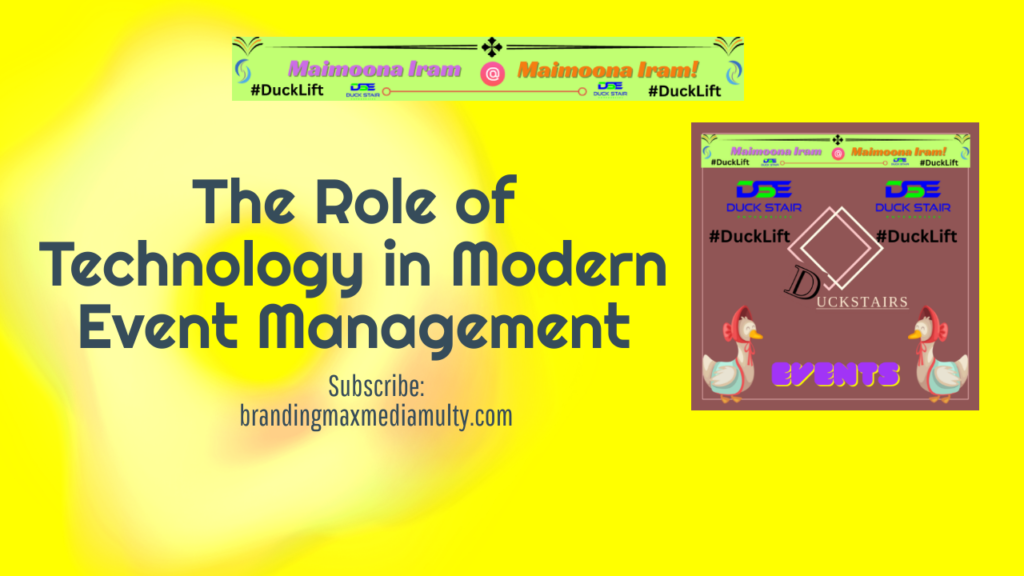The Role of Technology in Modern Event Management

The Role of Technology in Modern Event Management
In today’s fast-paced world, technology has revolutionized nearly every industry—and event management is no exception. From planning to execution, technology enhances every aspect of the event lifecycle, helping organizers save time, improve efficiency, and create unforgettable experiences. Here’s a breakdown of how technology is reshaping the world of event management:
1. Event Planning and Coordination Software
Role in Event Management:
Event planning software like Eventbrite, Cvent, and Whova provides tools to manage all aspects of an event in one place—guest lists, budgets, timelines, and even vendor management. These platforms simplify planning by offering templates, checklists, and automated reminders.
Benefits:
Streamlines communication between team members.
Ensures deadlines are met.
Allows easy collaboration between different departments or external vendors.
Reduces the risk of human error and disorganization.
2. Online Registration and Ticketing Systems
Role in Event Management:
Gone are the days of paper-based registrations. Today’s event organizers use online ticketing systems (e.g., Ticketmaster, Eventbrite, or Tito) to manage guest registrations, track attendee numbers, and issue tickets automatically.
Benefits:
Simplifies guest registration.
Offers convenient, secure payment options.
Reduces on-site check-in delays by allowing for electronic tickets or QR codes.
Helps with data collection and audience insights.
3. Mobile Apps for Attendees
Role in Event Management:
Custom event apps (like Bizzabo, Swapcard, or Whova) help attendees navigate the event with ease. These apps can include schedules, maps, speaker bios, live session updates, and networking tools.
Benefits:
Enhances the attendee experience by providing real-time event updates.
Facilitates networking by allowing attendees to connect with each other directly through the app.
Reduces the need for printed materials, making events more sustainable.
4. Virtual and Hybrid Events
Role in Event Management:
With the rise of virtual platforms like Zoom, Hopin, and Airmeet, event organizers can host virtual or hybrid events (combining in-person and online attendees). These platforms allow seamless broadcasting, live Q&As, and interactive sessions.
Benefits:
Increases accessibility for a global audience.
Reduces costs by eliminating the need for travel or large venues.
Allows for interactive elements such as polls, chat rooms, and virtual networking.
Helps reach a larger audience without geographical limitations.
5. Social Media Integration
Role in Event Management:
Social media plays a significant role in promoting and engaging with attendees before, during, and after an event. Platforms like Twitter, Instagram, LinkedIn, and Facebook can be used for marketing, live updates, and engaging with attendees.
Benefits:
Helps spread the word and increases event visibility.
Builds a sense of community around the event.
Allows for real-time interaction with attendees (e.g., live tweeting or Instagram Stories).
Creates post-event content that boosts long-term engagement.
6. Artificial Intelligence (AI) and Chatbots
Role in Event Management:
AI-powered chatbots (like Zippy or Meekan) are used to answer attendee questions, provide event info, and guide them throughout the event. AI can also personalize experiences, making recommendations based on preferences.
Benefits:
Provides instant support and answers to common attendee inquiries (24/7).
Personalised attendee experiences by offering tailored recommendations.
Reduces the workload for event staff, allowing them to focus on other areas.
Improves efficiency and keeps attendees engaged.
7. Data Analytics for Event Insights
Role in Event Management:
Technology allows event organizers to gather valuable data during and after the event. Tools like Google Analytics, Tableau, and HubSpot help track ticket sales, attendee behavior, session popularity, and engagement rates.
Benefits:
Allows for data-driven decision-making to improve future events.
Helps understand attendee preferences, demographics, and behaviors.
Measures event ROI by tracking leads, sales, or post-event follow-ups.
Improves event marketing strategies by analyzing attendee engagement levels.
8. Augmented Reality (AR) and Virtual Reality (VR)
Role in Event Management:
For events looking to create a truly immersive experience, AR and VR can be used for virtual tours, product demos, interactive displays, and entertainment.
Benefits:
Provides a novel, engaging experience for attendees.
Makes product showcases or exhibitions more interactive and memorable.
Enhances the event’s brand perception by showcasing cutting-edge technology.
9. Cashless Payment Systems
Role in Event Management:
With cashless payment solutions like Square, PayPal, and Venmo, event attendees can make quick, secure transactions without handling physical money. This is especially useful for large events with food trucks, merchandise, or ticket booths.
Benefits:
Speeds up transactions and eliminates long lines.
Reduces the risks associated with handling cash.
Improves tracking of sales and revenues in real-time.
10. Sustainable Event Management
Role in Event Management:
Technology has also helped reduce the environmental footprint of events. Digital tools for invitations, ticketing, and programs (replacing printed materials) contribute to a more sustainable approach.
Benefits:
Reduces paper waste and overall environmental impact.
Promotes eco-friendly practices among attendees.
Helps build a brand reputation focused on sustainability
Conclusion
Technology has become an indispensable tool in modern event management, offering unprecedented opportunities for efficiency, creativity, and attendee engagement. Whether you’re organizing a small workshop or a large-scale conference, technology allows event planners to streamline processes, deliver personalized experiences, and gather invaluable data for future improvements. By embracing the latest technological advancements, event managers can create events that are not only smooth-running but also memorable and impactful.
maimoonairam_56
https://brandingmaxmediamulty.comMaimoona Irm, Female, Belongs from Rawalpindi Pakistan. Dynamic, Innovative, Creative,